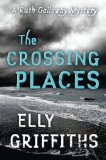Summary | Excerpt | Reviews | Beyond the Book | Readalikes | Genres & Themes | Author Bio

A Ruth Galloway Mystery
by Elly Griffiths
She eats her toast and drinks her tea (she prefers coffee
but is saving herself for a proper espresso at the university).
As she does so, she leafs through her lecture notes, originally
typewritten but now scribbled over with a palimpsest
of additional notes in different coloured pens. ‘Gender and
Prehistoric Technology’, ‘Excavating Artefacts’, ‘Life and
Death in the Mesolithic’, ‘The Role of Animal Bone in
Excavations’. Although it is only early November, the
Christmas term will soon be over and this will be her last
week of lectures. Briefly, she conjures up the faces of her
students: earnest, hard-working, slightly dull. She only
teaches postgraduates these days and rather misses the
casual, hungover good humour of the undergraduates. Her
students are so keen, waylaying her after lectures to talk
about Lindow Man and Boxgrove Man and whether
women really would have played a significant role in
prehistoric society. Look around you, she wants to shout,
we don’t always play a significant role in this society. Why
do you think a gang of grunting hunter-gatherers would
have been any more enlightened than we?
Thought for the Day seeps into her unconscious,
reminding her that it is time to leave. ‘In some ways, God
is like an iPod …’ She puts her plate and cup in the sink
and leaves down food for her cats, Sparky and Flint. As
she does so, she answers the ever-present sardonic interviewer
in her head. ‘OK, I’m a single, overweight woman
on my own and I have cats. What’s the big deal? And,
OK, sometimes I do speak to them but I don’t imagine
that they answer back and I don’t pretend that I’m any
more to them than a convenient food dispenser.’ Right
on cue, Flint, a large ginger Tom, squeezes himself
through the cat flap and fixes her with an unblinking,
golden stare.
‘Does God feature on our Recently Played list or do we
sometimes have to press Shuffle?’
Ruth strokes Flint and goes back into the sitting room to
put her papers into her rucksack. She winds a red scarf (her
only concession to colour: even fat people can buy scarves)
round her neck and puts on her anorak. Then she turns out
the lights and leaves the cottage.
Ruth’s cottage is one in a line of three on the edge of
the Saltmarsh. One is occupied by the warden of the bird
sanctuary, the other by weekenders who come down in
summer, have lots of toxic barbecues and park their 4 ×
4 in front of Ruth’s view. The road is frequently flooded
in spring and autumn and often impassable by midwinter.
‘Why don’t you live somewhere more convenient?’ her
colleagues ask. ‘There are some lovely properties in
King’s Lynn, or even Blakeney if you want to be near to
nature.’ Ruth can’t explain, even to herself, how a girl
born and brought up in South London can feel such a pull
to these inhospitable marshlands, these desolate
mudflats, this lonely, unrelenting view. It was research
that first brought her to the Saltmarsh but she doesn’t
know herself what it is that makes her stay, in the face of
so much opposition. ‘I’m used to it,’ is all she says.
‘Anyway the cats would hate to move.’ And they laugh.
Good old Ruth, devoted to her cats, child-substitutes of
course, shame she never got married, she’s really very
pretty when she smiles.
Today, though, the road is clear, with only the everpresent
wind blowing a thin line of salt onto her
windscreen. She squirts water without noticing it, bumps
slowly over the cattle grid and negotiates the twisting road
that leads to the village. In summer the trees meet overhead,
making this a mysterious green tunnel. But today the
trees are mere skeletons, their bare arms stretching up to
the sky. Ruth, driving slightly faster than is prudent, passes
the four houses and boarded-up pub that constitute the
village and takes the turning for King’s Lynn. Her first
lecture is at ten. She has plenty of time.
Excerpted from The Crossing Places by Elly Griffiths. Copyright © 2010 by Elly Griffiths. Excerpted by permission of Houghton Mifflin. All rights reserved. No part of this excerpt may be reproduced or reprinted without permission in writing from the publisher.
Your guide toexceptional books
BookBrowse seeks out and recommends the best in contemporary fiction and nonfiction—books that not only engage and entertain but also deepen our understanding of ourselves and the world around us.